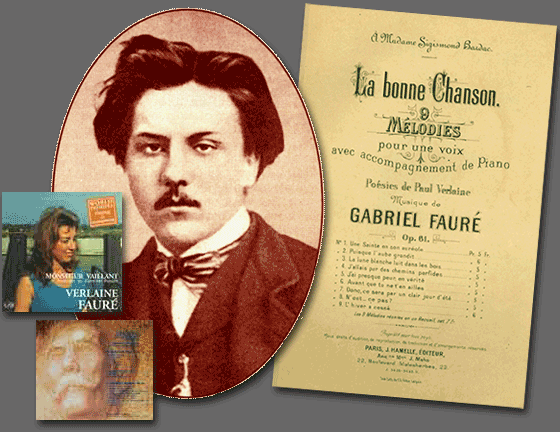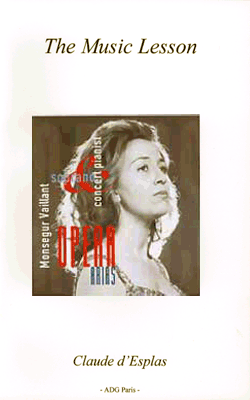
It was Winaretta Singer (Winnie), Princess Edmond de Polignac, who had the idea of wanting to couple the talents of Verlaine and of Fauré by asking them to write - jointly - a lyrical work which would inaugurate splendidly her large Atelier in Paris (the “Hall“, according to Marcel Proust) in Cortambert Street. The Princess accordingly invited Gabriel Fauré to Venice for a few days of ‘divine’ existence; there, Fauré started his op. 58 (Mandoline, more exactly) while Verlaine began his slow round of the Hospitals where the composer was to try to join him, “bed to bed with anybody”, in order to sketch joint projects that - from reported meetings to missed ones - never really materialized, in spite of the Princess' open-handedness or Verlaine's letter to Fauré, dated 16th April 1892, at the Hôpital Broussais (or was it at the Hôpital Watteau?), a letter peppered with ironic anglicisms (Collection Madame Fauré-Frémiet).
For tout cet ail de basse cuisine (“all this garlic of lowly cooking”, Verlaine, Art Poétique) that the ancestors of Gabriel Fauré, man of the South par excellence, would stick into the legs of lamb for their customers in Sunday - best in order to “soften” them better while inquiring after the little last-born or the old one who only advanced, now, but with the help of swigs of the Varilhes local wine, all this garlic could obviously not inspire Paul Verlaine, man of the North above all :
Flux de verve gauloise et flot
d'aplomb romain,
Avec, puisque un peu franc,
de bon limon germain
(“Flux of gallic verve and flood of Roman assurance with, because a bit frank, some good Germanic clay”), Verlaine who always preferred the fortified fare: l'appétit avait de la dent (“the appetite was keen”) of the Hospitals of the Walfare organisation: Je me nourris de gluten, de viandes rôties, de légumes vert, et ne bois que de bon vin (I feed on gluten, roast meats, green vegetables and only drink good wine”; Aï, Beaune, Sauterne, Grave or the divine Château Batailley?) for lack of hazy siestas in front of a glass of green absinthe in certain cafés of the Rive Gauche: des cafés que traverseront des bandes de musique (“cafés crossed by bands of music”) on the very edge of these artificial Paradises, such as in the Kaléidoscope where humans are reduced to masks or bergamasks under a calm Clair de lune (Moonshine) or an evanescent luminescence of souls in strange Dreams of a Midsummer Night.
The usher Verlaine in charge of the prep-room will in fact always pride himself on his knowledge of English. He will read Shakespeare (and his ‘Bergomasks’) or Dickens in the original during his ‘holiday’ at the Prison of Mons; he will stay in London or in the Provinces accompanied or not by Rimbaud, “the little dirt” (See, among others, the grammatical duel between Verlaine / Rimbaud in Verlaine's letter dated 18th May 1873, at Boglione) who was to drag him onto “perfidious paths”, in order to learn all the better the language of Edgar Allan Poe, his equal in dipsomania, before teaching it to the pupils of Rethel or of Reims. “Vôlez-vô dire à môa...” he liked to shout at his pupils in order to inculcate all the better the tonic accent. As for the director Fauré, he will be happy handling the oar on the Thames.
Saint-Saëns' Upper Normandy might have momentarily brought together the Poet and the composer (the Mauté de Fleurville, Mathilde among them, were staying at Gouëlle Manor, near Neufchâtel-en-Bray and the Baugnies, friends and admirers of Fauré, in their residence at Cuy-Saint-Fiacre - for lack of tow paths along la Scarpe or of the steep banks of the Seine at Bougival where Fauré will re-experience, En Sourdine (in Secret), the trepidation of his own betrothal to MarianneViardot, in a midday passion (La Bonne Chanson) for Emma Moyse (“some are gossiping about your age which is no longer 16 or 20 years”), Emma Bardac the beautiful secret lady counsellor of the great French melodists on the occasion of the Summer Nights at Prunay: L'hyver a cessé (the winter has ceased).
Fauré will admit, by the way : “I have never written anything so spontaneously as La Bonne Chanson. I must add that I was helped by the spontaneity of comprehension at least equal (to mine) on the part of her who remains its most moving interpreter” (letter from Fauré to Roger Ducasse, 17-05-1923) and even if “the young musicians are about unanimous in not liking La Bonne Chanson, as Marcel Proust, for his part, noted with regret. For Verlaine, as well as for Fauré, of course:
At 20 years of age a new confusion
Under the name o f love flames
Caused me to find women beautiful
They did not find me handsome.
It will therefore be necessary to await the meeting of Mathilde Mauté and Paul Verlaine, at Montmartre in order to exorcize this injustice, before the formal proposal of marriage to Une Sainte en son auréole (“a Saint in her halo”):
Bientôt nous porterons envie
Tellement nous nous aimerons,
Paul Verlaine (“Soon we shall cause envy, so much shall we love each other”).
Mathilde artless-innocent little bourgeoise whose voice was of “fine music”, in grey and green dress next to the grand piano Pleyel “kissed by a fragile hand” and that “shines in the evening vaguely pink and grey”. A piano which - in its tunic of probity - and far from the orgies of the Artois or of the Boulevard des Batignolles where the Cut-Throats and their Ladies venture as far as Pauline Viardot's Douai Street from where Berlioz ran towards the Château des Brouillards, from where one can also run downhill as far as Notre-Dame de Clignancourt; a piano which made it possible to know again lent réveil après bien des métempsychoses (“slow awakening after many metempsychoses”) un fin pays d'eau vive et de côteaux (“a fine country of live water and of hillsides”) where the fountains under La Lune blanche (the white moon) make un bruit 'assassins postés se concertant (a noise as of scheming assassins ready for action”) (O Pelleas, ô Mélisande!).
Others will sing Verlaine, the poet of shades, of the imprecise, of the impalpable, of verses which drag their wing or which limp like the partridge shortly before it flies off brusquely, invariably surprizing the hunter, the Verlaine poet of moods (Spleen), of whisper, of absolute confidence (Extase), the Verlaine sensitive to sound as much as to sense: J'ai presque peur (I am nearly afraid) or to this voice:
Qui fait comme du bien et du mal à la fois
Et le mal et le bien, tout a les mêmes charmes
(“which does like good and evil at the same time
And the evil and the good, it all has the same charms”)
this voice that Fauré alone (is Verlaine not “exquisite to set to music”?) will recognize in the confidences of Emma Bardac; a voice set in a casket of piano arpeggi, of harmonic instabilities, a voice that refuses all gaudy colours (“I shall be pleased to show you Gabriel Fauré's study”, letter from Madame Blanche Fauré-Frémiet to the author, 10-03-1979); a voice where only shades of meaning rule and which wrings the neck of eloquence and which goes “smelling of mint and thyme”, like the meadows after the very first cut in the heart of every June in the Barguilhère dales; a voice which satisfies with far away souvenirs of a mandoline or of the swaying of gondolas); a “medium voice” with opera timbre “with drive and without slowing down”, as Fauré appreciated them, he who loathed the “delicate throats”; a measured voice (Fauré was “a living metronome”, Claire Croiza insisted), a disciplined voice for a “difficult interpretation slow of movement and agitated in expression, happy and painful, ardent and discouraged” (letter to Winaretta Singer, on the subject of Green) or, also, as he advized the charming Madame Beaugnies: “not to sing slowly, the pace is lively, touched with emotion, almost panting”, directions that will attempt to follow - more or less helped by accompanists - all those Raunay, Balguerie, Breval, Croiza (“the vocal part is difficult to determine”, the latter noted with astonishment) or Madeleine Mathieu or others like Germaine Lubin (“I was at the Convervatoire when Gabriel Fauré was its Director and during four years he used to call me from my class and made me sing many of his Melodies - I was also his Penelope at the opéra. He liked me very much.” (Letter to the author, 20-03-1978).
A voice that will, accordingly, render to best effect these “chamber operas” or these “apartment symphonies” which are produced by the Faurean melody cycles, works in which instrument and song merge to the point of bringing together - all things considered and for ever: cette chair accroupie et cet esprit malade (this squatting flesh and this sick spirit), thas fulfilling the most secret wish of the Prince of poets who, alone, Mallarmé confirms: affronta dans toute l'épouvante l'état du chanteur et du rêveur (“faced in all its terror the state of the singer and of the dreamer”).
CLAUDE D'ESPLAS - The Music Lesson
ALL RIGHTS RESERVED
|






